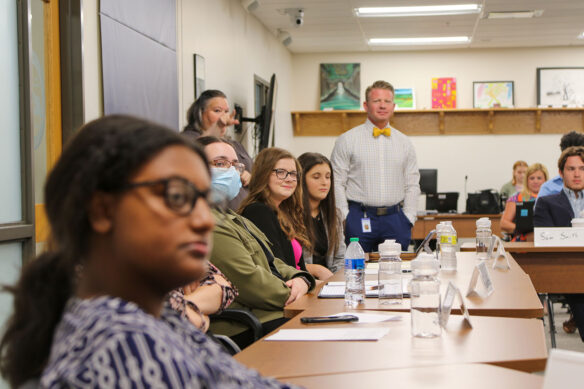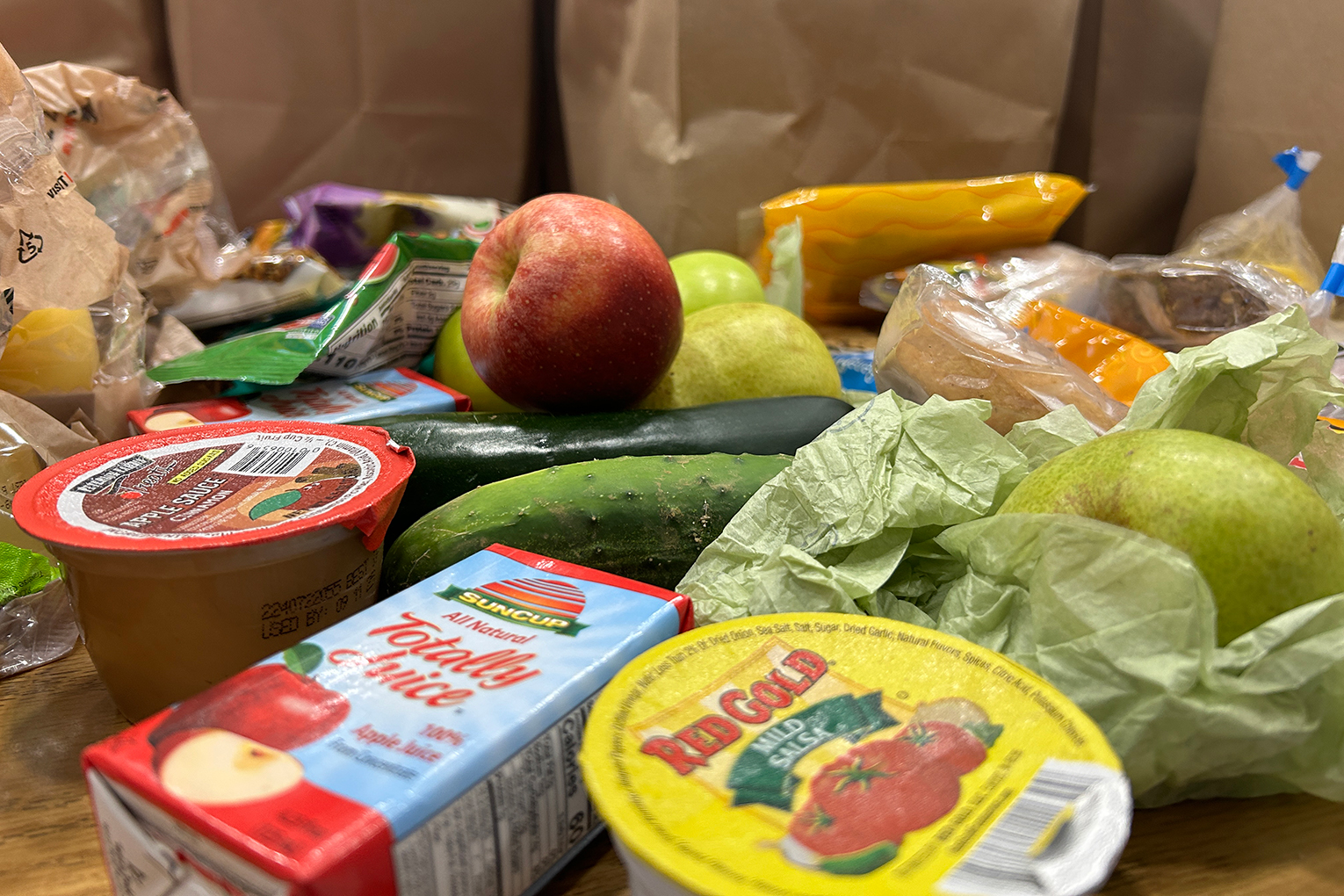
At its May 31 meeting in Frankfort, members of the Commissioner’s Student Advisory Council discussed policy recommendations for school safety following the May 24 school shooting in Ulvade, Texas. Many of the council members said they felt students have been excluded from the conversations surrounding the recovery and aftermath of the event.
Photo by Jacob Perkins, May 31, 2022
A week following the school shooting in Uvalde, Texas, students on the Kentucky Department of Education’s (KDE’s) Commissioner’s Student Advisory Council (SAC) discussed some policy suggestions for school safety at their May 31st meeting.
Kentucky Commissioner of Education Jason E. Glass spoke with the students about Uvalde and asked them to reflect on the days that have followed.
“In all of the debates that are happening nationally … it seemed to me that the student voice is not present in the conversation,” said Glass.
Students shared their responses to the shooting, ranging from anger, to sadness, to disgust, to disbelief, to exhaustion.
“I think it’s really scary as a student that we practice all of these drills, that we practice red codes and lockdowns, for the possibility of this becoming a reality and it’s still happening, despite our efforts to be safe in school,” said JuLeah Edie, a recent graduate of Rowan County High School.
Several students commented on statistics that show how prevalent mass shooting events are in the United States compared to other countries.
“It bothers me that the United States is the only country where school shootings are happening consistently,” said Raima Dutt, a junior at duPont Manual High School (Jefferson County). “In the U.S., guns have become politicized, which allows no progress to be made in preventing the issue from happening in the future.”
Soylana Mesfin, a recent graduate of Eastern High School (Jefferson County), said that having these conversations with students, although hard emotionally, is important and should be encouraged by schools.
“We are the ones being affected the most,” she said.
The students attending the meeting in-person worked together in small groups to share their thoughts on policy recommendations, and students participating virtually worked together on a shared document. Topics of interest to the students included background checks for gun purchases, early warning systems, law enforcement training, mental health supports and unfunded legislative mandates regarding school resource officers (SROs) in Kentucky schools.
This past legislative session, the Kentucky General Assembly passed House Bill 63, which requires an SRO on every school campus in Kentucky, with exceptions allowed by the Office of State School Security Marshal. However, the legislature failed to appropriate the funds necessary to pay for these positions or put in place the supports for law enforcement to train these new SROs.
Three categories were created to focus on those topics of interest: proactive events before a school shooting; actions in the event of an active shooter; and recovery from the effects of a school shooting. Students will dive deeper into these topics this summer and fall and begin writing a collective policy recommendation for legislators and other education stakeholders to read.
Amplifying Student Voice
KDE Associate Commissioner Byron Darnall invited the founders of the Iowa Student Learning Institute (IowaSLI), Ian Coon and Jack Hostager, to speak to the students about how their experiences at EdCampIowa and the Iowa Young Learner Council helped them create IowaSLI in the spring of 2013.
IowaSLI is led by a group of Iowa secondary students who are supported by a board of passionate educators. The organization is focused on revolutionizing Iowa’s approach to education through the power of student voice. Through events and online networking, IowaSLI brings together students, educators and community leaders from all over Iowa to improve education by empowering students to inspire change.
Hostager and Coon offered five pieces of advice to the students on Tuesday:
- Be a constructive stakeholder;
- Build relationships with other stakeholders;
- Set the agenda;
- Have a bold vision; and
- Involve as many other students as possible.
“There’s a lot of danger when you’re a student or a group of students trying to have a say in education to be tokenized or be thought of as cute,” said Hostager. “That can sometimes work to your advantage and make it easier for you to get into spaces and rooms with other people. But demonstrating strong organization and competence is important for getting adults to take you seriously and moving beyond that cute factor.”
IowaSLI works intentionally to bring in the voices of students who historically might be excluded – such as students without technology, students without cars, students who speak English as a second language and LGBTQ+ students.
Coon noted that events are important, but IowaSLI also made advocacy for policy change at the state and national level a key focus. IowaSLI hosts yearly “Day on the Hill” events where students go to the Iowa State Capitol to meet with legislators and discuss specific policy recommendations.
“We wanted to do more than just plan events and raise awareness. If people wanted to think about how they could affect change, it meant knowing how to do that at all levels,” said Coon.
Students on KDE’s council were able to share their experiences with state government officials, where they talked about their work with Lt. Gov. Jacqueline Coleman and student mental health advocacy. This led to the passage of House Bill (HB) 44, which allows local school districts’ attendance policies to include provisions for a student’s mental or behavioral health status.
“I felt like we were being truly listened to by people in really high places of power in the state legislatures,” said Daviess County High School recent graduate Sam Smith. “To me, that was my big takeaway, I did feel like we were making real change.”
Logan Justice, a recent graduate of Paul Laurence Dunbar High School (Fayette County) agreed that the students felt listened to because they were “able to start the conversations right away.”
Sense of Belonging Reflection
Florence Chang, a strategic analyst of learning from KDE’s Office of Teaching and Learning (OTL), shared statewide data on the high school sense of belonging. The data was collected from students who took state assessments in 2021.
According to the data, one out of five Kentucky public school high school students do not feel a sense of belonging. When looking at students of color, one out of four do not feel a sense of belonging. There was a wide range among districts in the percent of students of color that feel a sense of belonging, indicating wide variation in the student experience.
Chang said a sense of belonging is a very “important protective factor for kids.”
Students provided feedback on how to make them feel included from the first day of school, including more one-on-one time with teachers and staff, school support for identify-based clubs and being culturally sensitive during instruction.
In other business, the council:
- Welcomed the 17 new members to the 2022-2023 Commissioner’s Student Advisory Council. While several new members joined this meeting, the first official meeting of the 2022-2023 council will be in August; and
- Participated in a Mindful Moment activity with Heather Bushelman, program coordinator for comprehensive school counseling in KDE’s OTL.




Listening to student voices is vital in improving school safety. It’s inspiring to see Kentucky students actively engaged in discussions and making recommendations for a safer learning environment. Let’s continue amplifying student voice and work collaboratively to implement these important changes.